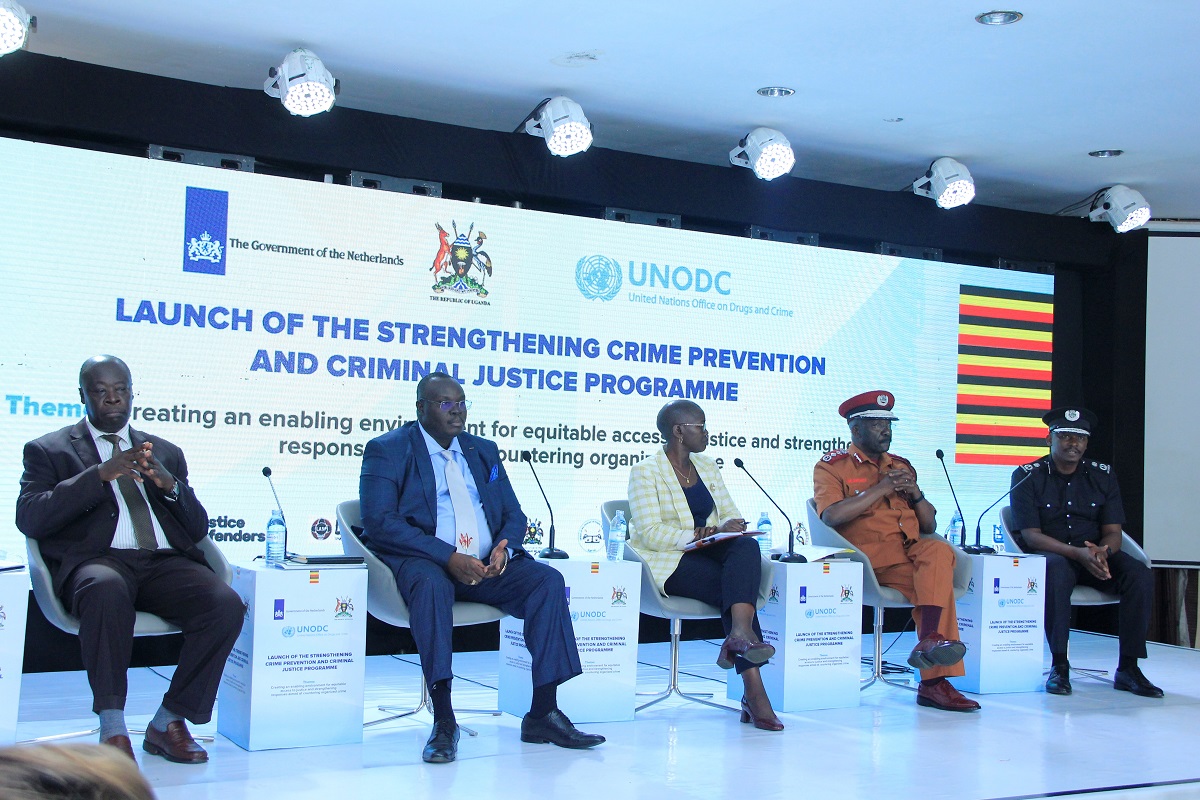UNODC Eastern Africa News and Stories
You are here: Home / News
UNODC launches new access to justice programme for Uganda
 5 December, Kampala – UNODC has launched a new programme to enable equitable access to justice and to strengthen responses to counter organized crime in Uganda.
5 December, Kampala – UNODC has launched a new programme to enable equitable access to justice and to strengthen responses to counter organized crime in Uganda.
The five-year, Strengthening Crime Prevention and Criminal Justice Programme, a product of a comprehensive consultative process with criminal justice institutions, is funded by the Embassy of the Netherlands in Uganda to the tune of $13 million (approximately 48.5 billion shillings).
Presiding over the launch of the programme on 25 November, 2022, the Deputy Chief Justice of Uganda, His Lordship Richard Buteera, commended the UNODC Programme Office in Uganda, for working with stakeholders in the criminal justice chain, to promote the rule of law and delivery of justice to the people of Uganda.
The Ambassador of the Kingdom of the Netherlands to Uganda, H.E Karin Boven pointed out that criminal justice systems in Uganda, equally around the world, face many challenges like high levels of crime and violence’ case backlogs; and insufficient financial and human resources. Typically, this has caused delays in the delivery of justice, overuse of pretrial detention and insufficient use of alternative sentencing options.

“The field of countering illicit financial flows – including corruption, money laundering and financing of terrorism and organized crime – is a new priority area for the Netherlands as these activities hamper the development of a country, undermine the rule of law and enhance inequality,” H.E Boven said.
Since 2017, the Netherlands, through a Joint Global Initiative implemented by UNODC, the UN Counter-Terrorism Centre and the United Nations Counter-Terrorism Committee Executive Directorate, and co-financed by the EU and United Nations Office of Counter-Terrorism, have been supporting the Government of Uganda to prevent violent extremism and support the management of violent extremist prisoners, while enhancing access to justice. The Ambassador said the new programme builds on the expertise of this initiative.

“Crime and terrorism is profit driven and profit orientated. What is the inherent value of crime? We shall work with the Financial Intelligence Authority and other institutions to identify those profits: How do the criminals and terrorists get value, how do they move it, how do they cash it, and how do they undermine society?” Mr Walsh stated.
“That’s what we shall be doing because ultimately, economic security is national security: Its not about only crime and justice, its about developing the economy; it is about getting those criminal finances out of the illicit economy and back into your licit economy. That will make a real big difference,” he added.
He said innovative solutions that fit Uganda’s legal system and skill-set in the criminal justice institutions will be made, to improve the business processes in the justice system and create an enabling environment for equitable access to justice for all, in line with international human rights standards.
Sustainable Development Goal (SDG) 16 of the 2030 Agenda enjoins the United Nations to promote peaceful and inclusive societies, provide access to justice for all and builds effective, accountable and inclusive institutions at all levels.
“A peaceful and just society is not only a goal by itself but is also a means to realizing many of the other SDGs, including those related to education, health, gender equality and decent work. Effective justice systems are central to enabling people, including vulnerable groups, to become equal partners in decision-making and development,” observed, Ms. Susan Ngongi Namondo, the UN Resident Coordinator for Uganda.
According to the UNODC Head of Office in Uganda, Ms Sharon Nyambe, the programme can be traced to the request made by former Ugandan Minster of Justice and Constitutional Affairs, Prof. Ephraim Kamuntu during a bilateral meeting with the UNODC Executive Director, Ms. Ghada Waly, on the sidelines of the 14th UN Congress on Crime Prevention and Criminal Justice in Kyoto, Japan.
During the meeting, the Government of Uganda requested for technical assistance towards Uganda’s quest to strengthen its criminal justice system and ability to respond to organized crime and related threats.
The programme objectives include; strengthening mechanisms for court administration and case management, increasing access to quality legal aid services for vulnerable groups; and promoting of alternatives to imprisonment.
Others are; crime prevention among the youth, including prevention of violent extremism, and the protection of the economy of Uganda from illicit financial flows and money-laundering.
The launch was followed by a panel discussion led by representatives of criminal justice institutions, who identified capacity building, digitization, mindset change, and expansion of legal aid services to the vulnerable and the poor as key entry points for the programme.
More information: